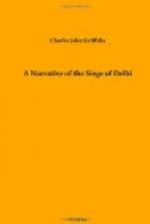All this time the batteries on the ridge, which from their high position could see what was going on, sent shells and round-shot at every opportunity over our heads, dispersing the mutineers when grouped together in any large number, and dealing death amongst them.
We saw them lying in heaps of twenty and thirty as we advanced, and the fire was so hot and the practice so excellent that the enemy evacuated the gardens and fled towards the suburb of Kishenganj.
Here the country was more open, so, re-forming our scattered line, with skirmishers in advance, we drove the rebels before us, the Horse Artillery playing on them in the open and bringing down scores.
Crossing the canal (which here barred our progress) by a bridge, we entered into a wide lane to the left, the high bank of the canal being on one side and the walls of a large caravanserai on the other.
The insurgents were posted at the far end of the lane, where it opened out at the gate of the serai, and received us, as we advanced at the double, with a rattling fire of musketry. Some climbed to the top of the bank, while others fired down at us from the walls. It was a perfect feu d’enfer, and the loss on our side became so heavy that a temporary check was the result, and it was only with great trouble that the men could be urged on.
Seeing a disposition to waver, Colonel W. Jones, the Brigadier under Chamberlain, with great bravery placed himself in front on foot, and called on the soldiers, now a confused mass of Sikhs, Goorkhas, and Europeans, to charge and dislodge the enemy from the end of the lane. He was answered with a ringing cheer, the men broke into a run, and, without firing a shot, charged the sepoys, who waited till we were within fifty yards, and then, as usual, turned and fled.
Some entered the caravanserai by the large gate, which they attempted to shut; but we were too quick for them, and following close on their heels, a hard fight began in the enclosure.
Others of the enemy ran onwards in the direction of the city, chased by portions of our force, who pursued them a long distance, and after a desperate resistance killed many who in their flight had taken refuge in the serais and buildings.
The party I was with in the great caravanserai ranged the place like demons, the English soldiers putting to death every sepoy they could find. Their aspect was certainly inhuman—eyes flashing with passion and revenge, faces wet and blackened from powder through biting cartridges; it would have been useless to attempt to check them in their work of slaughter.
Twenty or more of the insurgents, flying for life from their pitiless foe, made for a small building standing in the centre of the serai. They were followed by our men, who entered after them at the door. The house had four windows, one on each side, about three feet from the ground, and I ran to one and looked in.




